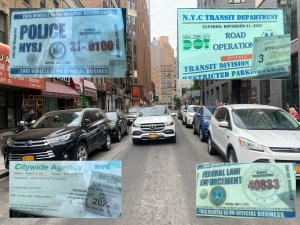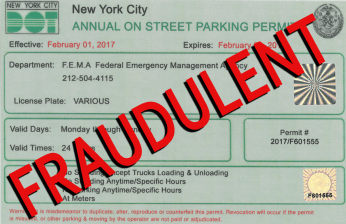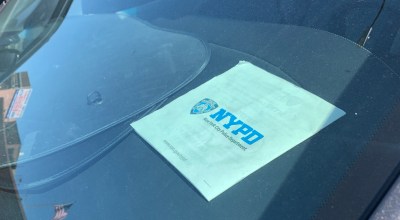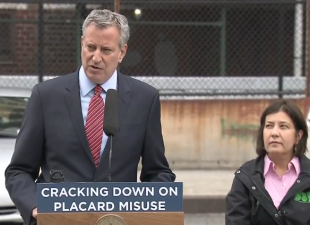Candidate Lincoln Restler: Let’s Abolish Placards Entirely

Want to fight placard abuse? Just get rid of the damn placards.
Lincoln Restler, a former top official in Mayor de Blasio’s City Hall who is running for City Council, says that if he’s elected, he’ll legislate the immediate demise of the roughly 60,000 placards that the de Blasio administration has given out to cops and other city employees and work towards eliminating placards that are part of existing labor contracts (such as the 50,000 or so that Restler’s former boss gave to city teachers).
The proposal also calls for remaining placards to be strictly enforced by a new, non-NYPD unit; for the Department of Transportation to eliminate placard-parking zones around city offices, courthouses and the like; and for the city to reduce its fleet size by nearly 20 percent, which would take 5,000 vehicles off the road.
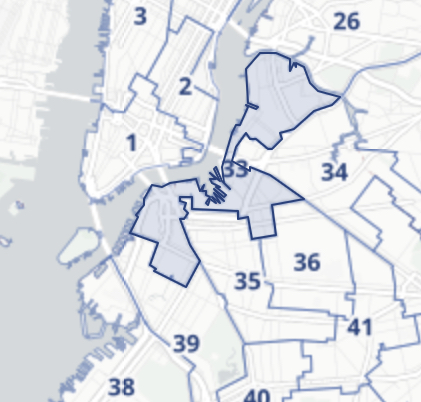
“The 33rd District has long been plagued by egregious placard abuse,” Restler said, referring to the twisting Greenpoint-to-Park Slope district that features known hotspots for the entry-level police corruption, including a stretch of Schermerhorn Street that flummoxed the current council member, Steve Levin. “City government should work for the public, not the other way around. Eliminating 60,000 placards will ensure we solve this problem once and for all.”
Restler added that if he was “lucky enough to get elected,” he would not accept a parking placard.
As all the candidates running to succeed Levin know, the 33rd District is a hotbed of placard abuse, particularly in Downtown Brooklyn and Brooklyn Heights. Levin has certainly focused attention on the issue, most recently with his bill to allow citizens to report illegally parked cars, including placard abusers — a bill that Restler, like others in the race, said he supports (the de Blasio administration opposes it, by the way).
Eliminating placards is the holy grail of street safety activists because illegally parked cars (looking at you, Hoyt Street) block bike routes and sidewalks, or generally make roadways more dangerous by defying DOT designs. A central problem, however, is that the city has doled out hundreds of thousands of the free-parking passes — a sizable chunk to NYPD officers, which not only facilitates their suburban commutes, but makes them reluctant to enforce parking rules against their brother and sister officers. (Mayor de Blasio, for whom Restler used to work, basically gave up on enforcing placard abuse during the last few years.)
Restler’s plan would eliminate the 45,000 or so police placards plus another 15,000 placards that have been issued by the Department of Transportation to federal, city and state employees, he said. His proposal would also eliminate DOT signs that reserve parking for placard holders in various agencies, excepting only authorized agency vehicles, not personal cars.

“The remaining placard holders would primarily be people with disabilities and Department of Education personnel who could use their placards in proximity to their schools,” said Restler, promising to phase out union-negotiated placards like those held by teachers. “This proposal would also significantly reduce the size of the city fleet,” which has increased 21 percent under the current mayor.
Restler said the full idiocy of the placard problem dawned on him the other day when he was walking past a Board of Elections office in Downtown Brooklyn and noticed that the DOT had set aside parking for election workers.
“There’s no legitimate reason why BOE staff need a reserved parking spot more than the public,” he said. “I want to stop this type of placard abuse, encourage more city employees to use mass transit just like most New Yorkers do everyday and open these spots to the public.”
Restler’s proposal has the support of the anonymous civic activists behind the Placard Abuse Twitter account, which constantly calls out illegal parking by city workers. (To be clear, the group is not endorsing any candidate in the race, but merely responding to a reporter’s request for comment on the proposal.)
“This plan seems to provide a multi-layered approach that covers the bases: reduce the number of placards based on actual functional needs, reduce unnecessary government vehicles, try to ensure real enforcement by a unit outside the control of the NYPD, and allow citizens to report the violations directly to the court to bypass any deficiencies in the enforcement agencies,” the Placard Abuse team said in an email to Streetsblog.
Restler’s top rival for the seat reacted favorably to the proposal, albeit with a quibble:
“I’m glad to see other candidates in the 33rd taking up the issues I raised in my plan in March, which detailed a path for a ground-up overhaul of placards with the aim of dramatically reducing their issue and abuse,” said Elizabeth Adams, Levin’s former legislative director. She has called for “intuitive street design and infrastructure that keeps cars out of pedestrian, bike, and transit space”; for a reduction in the city fleet; for the creation of more loading zones; and more enforcement against “known violators, like UPS, to fund bike lane infrastructure needs.” But her placard plan did not call for the elimination of the parking passes entirely.
Meanwhile, several other candidates sniffed at Restler’s proposal.
“Eliminating placards may sound like an easy way to appease things in the short term, but they aren’t the problem — their abuse is,” said Toba Potosky, who called for the city to simply use tracking devices to automatically issue tickets if cars are misparked.
“Enforcement can happen effectively,” he added. “Violators would receive tickets in the mail as they currently do with traffic cameras.”
Benjamin Solotaire, another Levin staffer running for the seat, said Restler’s program goes “too far.”
“I wouldn’t take away DOT spots because teachers can’t be driving around looking for spots when they should be in class, even though I would encourage everyone to take public transportation or bike,” Solotaire said. He agreed that “placard abuse is a problem that needs to be addressed,” but said he would do it with “more stringent criteria” for obtaining a placard. Like Adams, he also supports Levin’s citizen enforcement bill.
April Somboun also called for “a narrower definition of what is allowable with the placards.”
“Also, April doesn’t agree with eliminating all discretionary placards,” said her spokesman Brian Fitzgerald. “There needs to be better controls, but she feels that eliminating them completely will create more problems. It is true, we need to do more to protect biking paths, walking routs and green spaces. However, essential services also need places to park.”
He added that, “It is important to note that April doesn’t own a car. She 100 percent walks the walk when it comes to doing her part to lower traffic congestion.”
